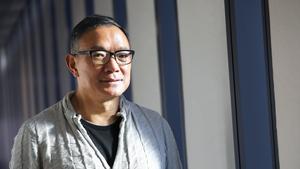 Paul Tse Wai-chun, district councilor, talks to China Daily on his concerns that the District Councils might become too politicalized. (CALVIN NG / CHINA DAILY)
Paul Tse Wai-chun, district councilor, talks to China Daily on his concerns that the District Councils might become too politicalized. (CALVIN NG / CHINA DAILY)
Paul Tse Wai-chun, one of the very few pro-establishment candidates who have won a seat in the 2019 District Council elections, said he is concerned most voters have given little consideration to the ability and track records of candidates.
He believes it is unfortunate that many pro-establishment candidates who worked very hard to serve their communities failed to retain their seats. Many got 3,000 votes or more but ultimately lost in an election that saw a record turnout of 71.2 percent.
Not only will they (District Councils) disappoint citizens if they spend more time on politics and neglect people’s livelihoods, they will also face legal challenges
Paul Tse Wai-chun, re-elected district councilor
Tse was re-elected in the Broadwood constituency of the Wan Chai District Council, garnering 2,121 votes — a very respectable increase from 1,350 votes last time — beating his only rival, who had 1,887 votes.
He told China Daily in an exclusive interview: “Such a high turnout is unprecedented because many people who did not vote in the past came out this time to express their dissatisfaction with the government or their dissatisfaction about other things.
“I am lucky because Broadwood is a middle-class neighborhood, where the residents are people with higher education and who earn HK$90,000 (US$11,600) to HK$100,000 per month. They are also conservative or astute people less influenced by irrational matters, and they favor my balanced views.”
With the opposition candidates dominating the 2019 district elections, Tse said there were four members in the Wan Chai District Council who do not belong to the “pan-democratic” camp — which some have recently started calling the “pan-violence” camp.
“We have the most pro-establishment members compared with other District Councils. So at least, we have a few voices to counter the ‘pan-violence’ camp,” he added.
Tse said the opposition camp earned the “pan-violence” tag by refusing to disassociate itself from violent elements. Its members even implored the rioters to “cease” for a short time so the election could proceed, after the government warned that polling would be canceled if the violence persisted. They also begged the militant protesters to vote for them and thanked them after they won, Tse said.
Tse is worried about the politicization of District Councils after they held their first meeting last week. Some District Councils overturned projects approved during the previous term. Committees were also formed to investigate the way police have handled violent protests.
At one District Council meeting, the members even sang a political song making references to Hong Kong independence.
Tse, who is also a lawmaker and a lawyer, said: “It was not an ordinary song. It is inappropriate to sing political songs at a meeting because a District Council is part of the establishment and funded by public money.
“District Councils should operate in accordance with their terms and references. They may contravene the rules if they abuse their powers or pass unjustified motions. Not only will they disappoint citizens if they spend more time on politics and neglect people’s livelihoods, they will also face legal challenges,” he said.
“There is no mechanism for District Councils to overturn approved projects such as the music fountain project of Kwun Tong District Council. Moreover, funding has been granted by the Legislative Council Finance Committee and tenders are being sought.
“The government can ignore the District Councils, who are only advisory bodies, and go ahead with the approved projects,’’ Tse said.
“The opposition camp will surely criticize the government for not respecting the decisions of the current District Councils, but have they ever respected the government or the decisions of the previous District Councils?”


